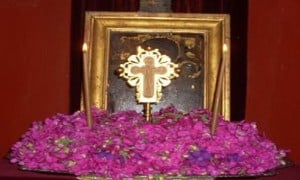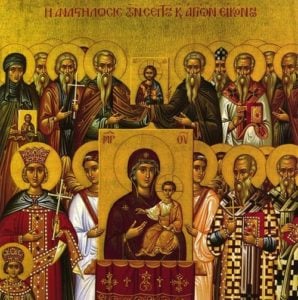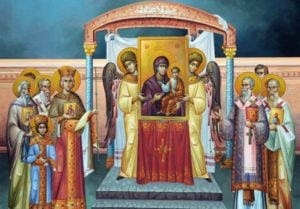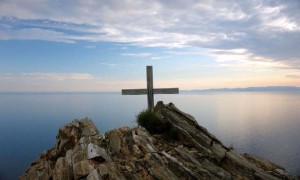Great Lent, the Welcome Time – ΙΙ
28 February 2023[Previous post: http://bit.ly/16kyrrJ]
B.
But the hymnographer also calls Great Lent something else. He says it’s the time of repentance. If we want to understand better why he gives it this appellation, we need to define precisely what repentance is.
God invites everyone, each of us, to come into communion with Him. But, as people, we’re sinners. We carry within us the tendency towards sin and we often submit to its provocations. We willing subject ourselves to the yoke of sinful passions and tread down upon the will of God.
So our answer to God’s invitation presupposes from the beginning a turn around and, thereafter, throughout our lives, an attitude of repentance.
Repentance, therefore, means that we distance ourselves from what is evil and turn towards God. It is precisely this that defines the essence of this turnaround, which involves a change of behaviour, a new orientation of the whole of our life and way of living.
This becomes apparent in the significance given by the Scriptures to the verbs “repent” and “return”, which are used frequently. The verb “to repent” generally means an internal turnaround, a change of mind and outlook, while “to return” usually denotes a change in practical behaviour.
We’re able to see precisely what we mean by “repentance” through the wonderful definition of it given by Saint John of the Ladder in his fifth discourse:
“Repentance is the recall of baptism;
Repentance is a pact with God for a second life…
Repentance is conscious purification”.
In other words, repentance is a return to the purity and grace we enjoyed at the moment of our baptism. It’s a fresh agreement with God about a new way of life. It’s the cleansing of our conscience.
Repentance is the foundation of the Christian life. It’s an attitude to life, which embraces the whole of our time here on earth. It floods our hearts on a daily basis.
Repentance is an outstandingly dynamic event, a condition rather than a momentary phenomenon. We Christians have to live in repentance.
If repentance ought to stamp the whole of our lives, how much more should we practice it in the sacred period of Great Lent, into which we are ushered at Vespers this evening.
Lent really is the period of repentance. It aims at preparing us spiritually to participate worthily in the celebration of the Passion and Resurrection of our Lord. And for that to happen, we have to follow the path of repentance, which means a change of mind, a profound renewal and a genuine turnaround. An internal alteration, but also a real return. To God and His Gospel. To the life that He inspires and which we can live only in His Church in the communion and unity of all the redeemed children of God.
C.
None of this is a theoretical hypothesis. It’s actually a very concrete way of life. The sacred hymnographer, underlines it emphatically, again having recourse to the words of Saint Paul: “Let us reject the works of darkness and take up the weapons of light”.
The deeper meaning of repentance is to be found in this double and fundamental aim: to get rid of the works of darkness, of sin; to cast off the yoke of the various passions; to root out from our heart every passionate desire.
And at the same time, we should take up the weapons of light. As soldiers of Christ (II Tim. 2, 3) we need weapons, and, for the faithful, this means the Christian virtues. These are the weapons with which we counter the “schemes” of the devil (Eph. 6, 11).
Saint John Chrysostom teaches: “Let us cast off imaginings, free ourselves of the dreaminess of this present life, reject torpor and instead clothe ourselves in virtue rather than garments. For this is what is meant by: ‘Let us reject the works of darkness and take up the weapons of light’. The day calls us to arms and to battle”.
And to put on virtue doesn’t mean conforming to some external commandments, but a profound change in our inner world.
In the end, our garment is Christ Himself. Saint Symeon the New Theologian asks: “And what is it that I and everyone else should clothe ourselves in so that we will not then be found naked?”. And he answers: “Christ and God, brethren!”.
And to clothe ourselves in Christ means that Christ dwells inside us. Then we live united to Him. Then we follow Him faithfully and observe His holy commandments with no thought for ourselves.
***
Brethren,
“The time for the beginning of the spiritual contests has arrived”. It’s Great Lent, the welcome time, the time of repentance, which, once again, the love of God has granted us.
Let’s accept it with joy and make the best use of it.
And, through the prayers of His all-holy Mother and the intercessions of all the Saints, may Christ make us worthy “to fight the good fight, to finish the course of the fast, to preserve the faith intact, to shatter the heads of the invisible dragons, to be shown to be victors over sin, and, uncondemned, to come to reverence the holy Resurrection”.
Source: Στο κατώφλι της Μεγάλης Τεσσαρακοστής, Λειτουργικά και κατανυκτικά κείμενα, 2nd ed., Apostoliki Diakonia, Athens 2002, pp. 15-26.












